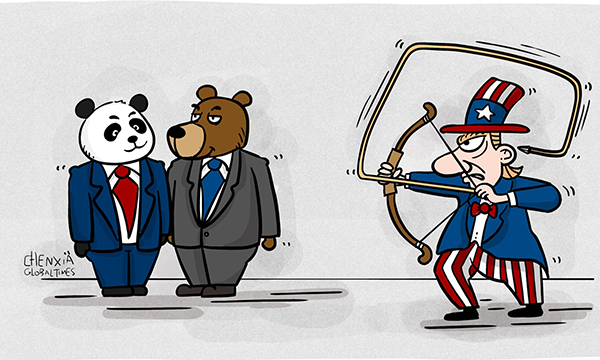
Russia had drawn a line in the sand and, once violated, defied Washington by acting to defend its interests. A lot of countries support Russia, and Washington is powerless to stop it.
If you are like me, you have been glued to the news about the Russian military operation in Ukraine and its implications for the world. Obviously, we cannot know about all of these implications at this point, and we may not for some time to come. Indeed, this recalls to mind Nixon’s query to Zhou Enlai in 1972 about his thoughts on the French Revolution. Zhou, with his long-term view of the world, responded simply, “too soon to say.”
However, we are seeing some developments emerge very quickly which may tell us where all of this is heading. First, in response to the U.S.’s extreme sanctions on Russia, including its removal of the Russian Central Bank from the SWIFT banking system, Russia and China have quickly pivoted to transferring money through other means and to trading on the Chinese Yuan.
And now, the U.S.’s long-time ally Saudi Arabia is also considering doing the same.
Meanwhile, leaders of both Saudi Arabia and the UAE are reportedly refusing to take calls from President Joe Biden during the Ukraine crisis. In another big move, the UAE—which was one of the nations which waged a surrogate war against Syria and its President, Bashar al-Assad, for ten years—has now received Assad in Dubai, stating that Syria is an essential part of Arab security. This must be maddening to the U.S. which still occupies one-third of Syria and still considers Assad persona non grata.
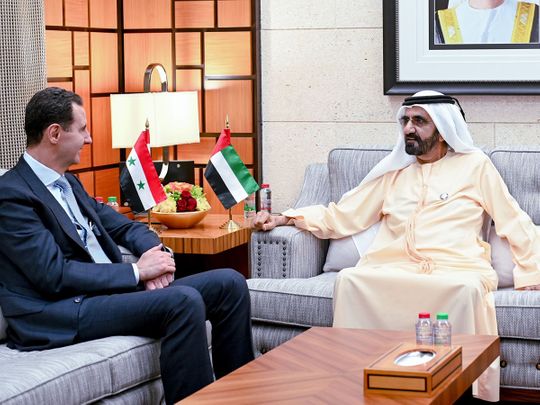
Then, we see U.S. delegations going hat in hand to both Venezuela and Iran—long-time targets of U.S. regime-change attempts and sanctions—seeking oil from these countries to try to offset the net reduction of oil and natural gas supplies caused by the war in Ukraine and the sanctions leveled in response to it. The President of Venezuela, Nicolás Maduro, whom the U.S. does not even recognize as the elected leader of Venezuela, must have been delighted to have the U.S. come groveling for help only to turn it away empty-handed.
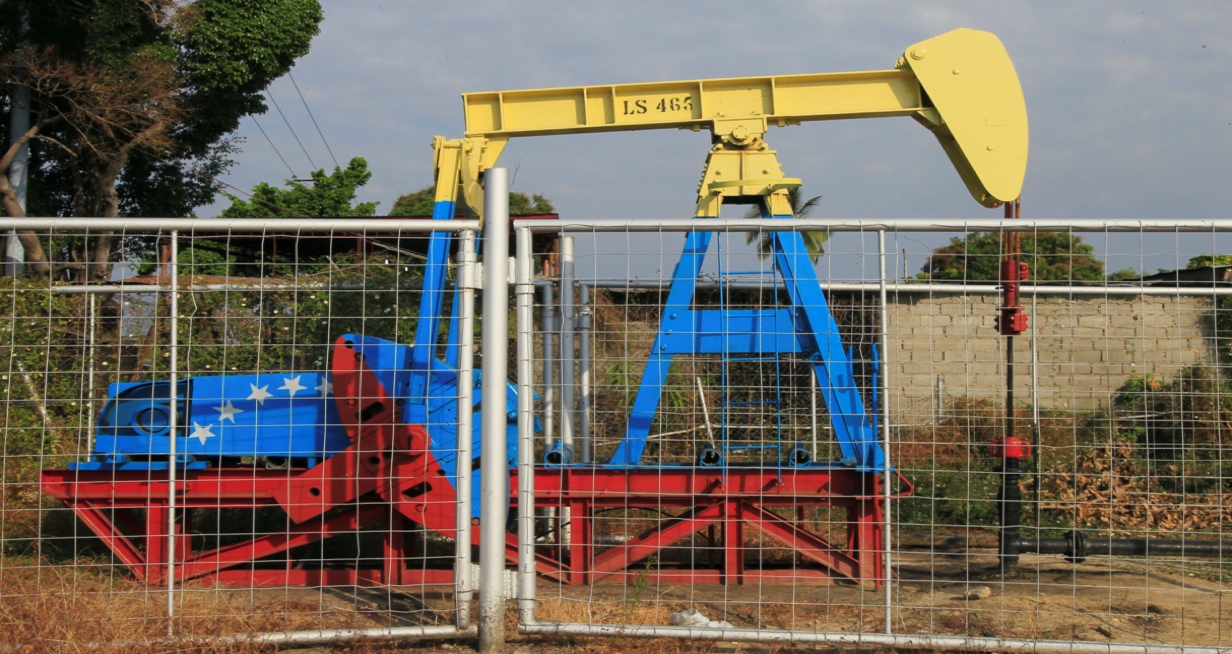
And while the U.S. is attempting to claim that the world is on its side in wanting to isolate Russia, the opposite is actually true. Thus, if one looks at the countries that either voted against, abstained from or simply did not vote at all on the UN General Assembly resolution condemning Russia’s actions—(against) Russia, North Korea, Eritrea, Belarus and Syria; (abstaining) China, India, Iran, Iraq, Algeria, Angola, Armenia, Bangladesh, Bolivia, Burundi, Central African Republic, Congo, Cuba, El Salvador, Equatorial Guinea, Kazakhstan, Kyrgyzstan, Laos, Madagascar, Mali, Mongolia, Mozambique, Namibia, Nicaragua, Pakistan, Senegal, South Africa, South Sudan, Sri Lanka, Sudan, Tajikistan, Tanzania, Uganda and Vietnam; (not voting) Azerbaijan, Burkina Faso, Cameroon, Eswatini, Ethiopia, Guinea, Guinea-Bissau, Morocco, Togo, Turkmenistan, Uzbekistan and Venezuela—one sees that countries representing the majority of the world’s population and a huge portion of its land mass are not with the U.S. on this.
Similarly, as long-time member of the Communist Party of the Russian Federation (CPRF) and former Russian parliamentarian Vyacheslav Tetekin explains, “the claims about global nature of boycott of Russia are false. BRICS countries (Brazil, India, China and South Africa) constituting 43% of the world population did not support sanctions. China is the 1st and India—third biggest economies of the world. Sanctions were not supported by Asia (excluding Japan and South Korea with their U.S. military bases), by the Middle East, by the largest countries of Latin America and by the majority of the African nations.”
Tetekin, stating the important point that, while the current Russian leadership is not one he supports and is indeed in opposition to, he does agree with its decision to take action in Ukraine to defend the people of the Donbass—people the CPRF has actively supported, Tetekin explains, for eight years with volunteer fighters and humanitarian aid—and to defeat the neo-Nazi forces there.
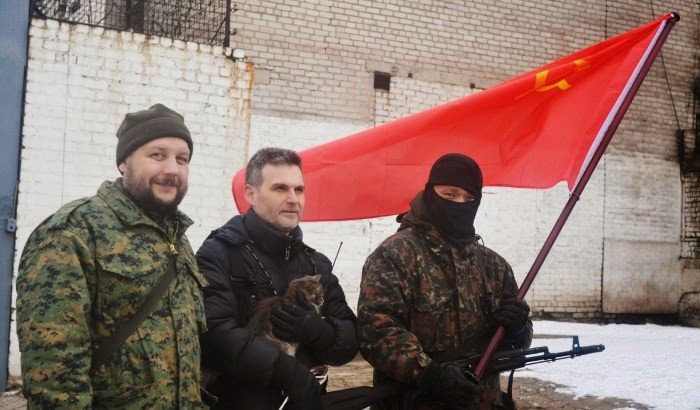
As Tetekin writes, “[f]or 30 years I have been one of the most active critics of the domestic and foreign policy of the Russian elite. In its class character, the oligarchic-bureaucratic power in Russia is not much different from the power in Ukraine (except without fascism and full U.S. control). However, in those unfortunately rare cases when the leaders of Russia pursue a line that meets the historical interests of the country and the people, the principle of ‘automatic’ criticism is hardly appropriate.”
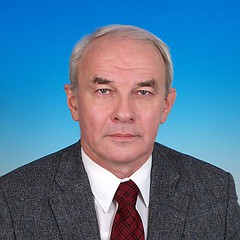
It is important to note that it was the CPRF which originally submitted the resolution in January of this year to the Russian Duma which requested that President Putin recognize Donetsk and Lugansk—a resolution which the Duma ultimately approved and which Putin ultimately acted upon in February.
Meanwhile, a number of important world leaders have been very clear that they firmly put the blame upon the U.S. and NATO for what has happened in Ukraine.
For example, former Bolivian President Evo Morales—victim of a U.S.-backed coup in 2019—denounced the “crimes against humanity” committed by Ukraine since 2014, and said that “the U.S. always provokes wars to sell its weapons, interventions, military bases, to take over natural resources (…) It is not only looking for Ukraine’s resources, but also to encircle Russia militarily.”
Morales called for an “international mobilization to stop the interventionist expansionism of NATO and the U.S.,” which he referred to as “the main enemy of humanity, threaten[ing] life, peace, and the economy through its expansionist, interventionist and warmongering policy.”
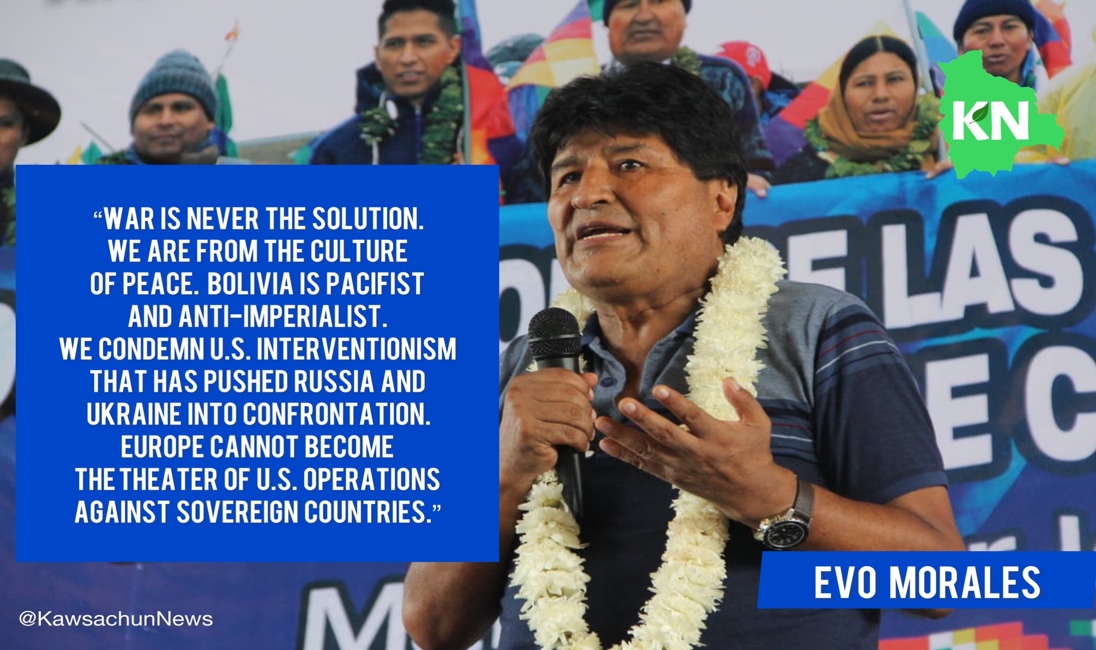
Morales’s statement comes as top-secret documents have been revealed proposing NATO expansion into Latin America, both through the British Mount Pleasant base in the Falkland Islands (islands which the UK forcibly took from Argentina in 1982) and through Colombia, which has been an “extra-continental partner since 2017 and . . . was already used to train Bolivian Air Force officers.”
And, of course, the U.S. and Colombia held joint naval exercises off the coast of Colombia—exercises which included a U.S. nuclear submarine—within days of the Russian invasion of Ukraine. According to Colombian Defense Minister Diego Milano at the time, “[t]his exercise is carried out within the scope of NATO, in the case of Colombia as a global partner country, it seeks to adapt the best international standards in the development of maritime operations.”
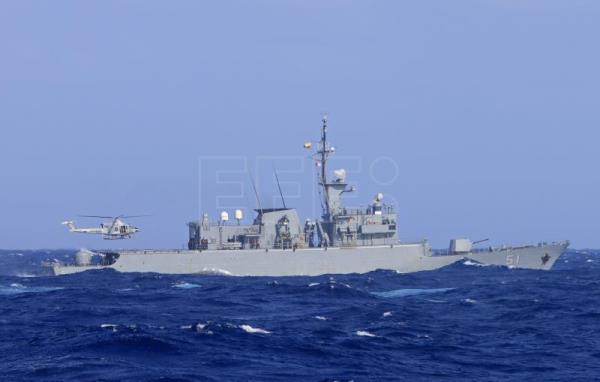
While the U.S. may still be powerful militarily and able to coerce allies in South America, the almost sole domination which the U.S. exercised with great glee after the collapse of the Soviet Union in 1991 is coming to an end. The Russian operation in Ukraine is not the cause of this shift, but it is certainly speeding it up. For years, the world has watched as the U.S. and NATO expanded up to Russia’s borders, and even beyond to places like Colombia; bombed and invaded one nation after another (e.g., Serbia, Iraq (twice), Afghanistan, Libya, Syria, Somalia, Yemen) at will and with complete impunity; and flaunted international law as if it were a mere trifle. In addition to causing huge suffering, this has caused great resentment and frustration amongst the world community which seemed powerless to stop the Western onslaught.
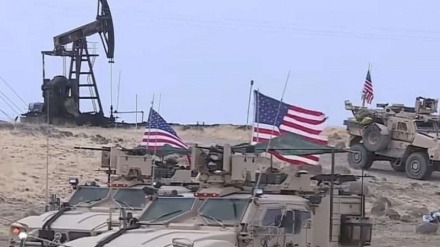
The Russian operation in Ukraine, which many see as an operation against NATO itself, marks the end of all this in a profound way. While the U.S. condemns this operation, citing international law, anyone paying attention knows that the international law it relies upon has been violently destroyed by the U.S. itself which, inter alia, has made a point to show the world that it could act militarily against other countries (e.g., Serbia, Iraq) without even seeking UN Security Council authorization as it is required to do; ignored the decisions of the International Court of Justice and withdrew from most of its jurisdiction; and even sanctioned International Criminal Court officials for announcing their intention to investigate U.S. war crimes in Afghanistan.
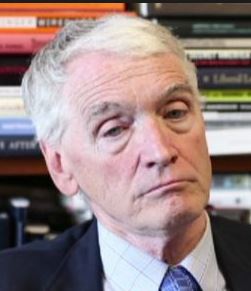
International law experts, such as Professor Francis A. Boyle, have commented that Russia was acting within the self-defense provision of Article 51 of the UN Charter through its Ukraine operations given the real and imminent threat that Ukraine forces represented to Russia and to the ethnic Russians living in Ukraine (many of whom are Russian citizens). (Boyle also argues, by the way, that the U.S.’s biolabs in Ukraine are definitely bio-weapons facilities, and he should know given that he helped draft the biological weapons ban Convention.) In any case, whether one agrees with Boyle or not, what is true is that Russia certainly has a better case under international law for its actions in Ukraine than the U.S. has had for invading countries halfway around the world which presented absolutely no threat to the United States.
And even more to the point of the present discussion, Russia’s operations in Ukraine, understood as a strike against NATO aggression and encirclement, signals the end of the U.S. and NATO’s ability to act unilaterally around the world at will and without any repercussions. Russia had drawn a line in the sand, and once crossed by the West, it acted militarily to defend its interests.
This is something that no country has dared to do since the end of the Cold War, and this marks the end of the “New World Order”—a doctrine pursuant to which the U.S. assumed to itself the role of master of the world—which President George H.W. Bush announced as the East Bloc was collapsing and which has been in place till now. Not surprisingly, most of the world never liked the terms of the “New World Order” to begin with, were in fact victimized under that regime and certainly are not going to do anything now to stop it from crumbling.

CovertAction Magazine is made possible by subscriptions, orders and donations from readers like you.
Blow the Whistle on U.S. Imperialism
Click the whistle and donate
When you donate to CovertAction Magazine, you are supporting investigative journalism. Your contributions go directly to supporting the development, production, editing, and dissemination of the Magazine.
CovertAction Magazine does not receive corporate or government sponsorship. Yet, we hold a steadfast commitment to providing compensation for writers, editorial and technical support. Your support helps facilitate this compensation as well as increase the caliber of this work.
Please make a donation by clicking on the donate logo above and enter the amount and your credit or debit card information.
CovertAction Institute, Inc. (CAI) is a 501(c)(3) non-profit organization and your gift is tax-deductible for federal income purposes. CAI’s tax-exempt ID number is 87-2461683.
We sincerely thank you for your support.
Disclaimer: The contents of this article are the sole responsibility of the author(s). CovertAction Institute, Inc. (CAI), including its Board of Directors (BD), Editorial Board (EB), Advisory Board (AB), staff, volunteers and its projects (including CovertAction Magazine) are not responsible for any inaccurate or incorrect statement in this article. This article also does not necessarily represent the views the BD, the EB, the AB, staff, volunteers, or any members of its projects.
Differing viewpoints: CAM publishes articles with differing viewpoints in an effort to nurture vibrant debate and thoughtful critical analysis. Feel free to comment on the articles in the comment section and/or send your letters to the Editors, which we will publish in the Letters column.
Copyrighted Material: This web site may contain copyrighted material the use of which has not always been specifically authorized by the copyright owner. As a not-for-profit charitable organization incorporated in the State of New York, we are making such material available in an effort to advance the understanding of humanity’s problems and hopefully to help find solutions for those problems. We believe this constitutes a ‘fair use’ of any such copyrighted material as provided for in section 107 of the US Copyright Law. You can read more about ‘fair use’ and US Copyright Law at the Legal Information Institute of Cornell Law School.
Republishing: CovertAction Magazine (CAM) grants permission to cross-post CAM articles on not-for-profit community internet sites as long as the source is acknowledged together with a hyperlink to the original CovertAction Magazine article. Also, kindly let us know at info@CovertActionMagazine.com. For publication of CAM articles in print or other forms including commercial internet sites, contact: info@CovertActionMagazine.com.
By using this site, you agree to these terms above.
About the Author

Daniel Kovalik graduated from Columbia University School of Law in 1993. He then served as in-house counsel for the United Steelworkers, AFL-CIO (USW) until 2019.
While with the USW, he worked on Alien Tort Claims Act cases against The Coca-Cola Company, Drummond and Occidental Petroleum—cases arising out of egregious human rights abuses in Colombia.
The Christian Science Monitor, referring to his work defending Colombian unionists under threat of assassination, described Mr. Kovalik as “one of the most prominent defenders of Colombian workers in the United States.”
Mr. Kovalik received the David W. Mills Mentoring Fellowship from Stanford University School of Law and was the recipient of the Project Censored Award for his article exposing the unprecedented killing of trade unionists in Colombia.
He has written extensively on the issue of international human rights and U.S. foreign policy for the Huffington Post and Counterpunch and has lectured throughout the world on these subjects. He is the author of several books including The Plot To Overthrow Venezuela, How The US Is Orchestrating a Coup for Oil, which includes a Foreword by Oliver Stone; The Plot to Attack Iran: How the CIA and the Deep State Have Conspired to Vilify Iran; and with Jeremy Kuzmarov, Syria: Anatomy of a Regime Change.
Daniel can be reached at dkovalik@outlook.com.


[…] 2022-03-24 Russia’s Invasion of Ukraine Signifies the End of an Era of Unipolar American Power Russia had drawn a line in the sand and, once violated, defied Washington by acting to defend its interests. A lot of countries support Russia, and Washington is powerless to stop it. https://covertactionmagazine.com/2022/03/24/russias-invasion-of-ukraine-signifies-the-end-of-an-era-… […]
[…] March 24, 2022 Covert Action Magazine […]
[…] Daniel Kovalik, published on Covert Action Magazine, March 24, […]
Dan: You’ve covered a lot of turf here, and done it exceptionally well. Many thanks!
Regarding “Russia’s operations in Ukraine, understood as a strike against NATO aggression and encirclement, signals the end of the U.S. and NATO’s ability to act unilaterally around the world at will and without any repercussions”, I for one fervently hope so. Since the time I read William Blum’s “Rogue State” many years ago, I’ve watched in dismay as my country became ever MORE rogue. Its comeuppance has been long overdue, and I was delighted when Mister Putin (quite appropriately) finally said, “Nyet!”
[…] Russia’s Invasion of Ukraine Signifies the End of an Era of Unipolar American Power, by Daniel Kov… […]
LOL, how nonsensical. And btw, President Putin is not an authoritarian losing leader. He’s the duly elected, patriotic leader of his great nation. With 70% approval of the Russian Federation’s citizens.
And one of the greatest statesman in the world today.
The above was in reply to Ed’s comment
Sometimes politics is like sports. When an authoritarian sports coach has a losing team he will be fired and replaced by a nice coach. Or if a nice sports coach has a losing team he will be fired and replaced by an authoritarian coach. Since Putin is an authoritarian losing leader he will soon be replaced by a nicer man.
When this nicer man becomes President of Russia there will be a big improvement in the relations between Russia and the United States. I am often wrong but this is what my crystal ball is telling me. .
Ed, it’s not real bright to think geopolitics is about personalities, not the placement of troops, weapons, and natural resources. Russia would have had to confront NATO no matter who was President.